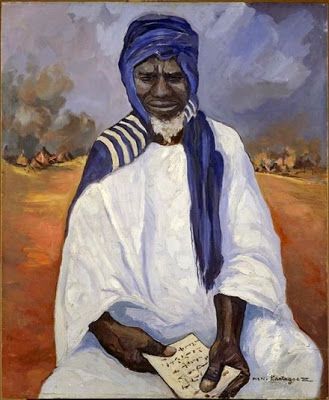Toure, Samori
ca. 1830–1900
Ruler in Guinea
Samori Toure built a state that stretched far across the savannas of what is now the Republic of GUINEA and defended his kingdom for many years against French colonization. Toure was born along the upper Milo River in the highlands of Guinea. The valley of the Milo was an important long-distance trade route that linked the Guinea coast to the interior. Merchants from different areas settled at key points along the route. Many were originally Muslims, although some abandoned Islam to adopt the beliefs of the local people. Samori Toure belonged to such a family.
In the 1850s Toure learned the arts of war in conflicts among the small states that competed for control in the Milo River valley. He then became a military leader among his mother's kinfolk. Organizing the local warriors into disciplined units of foot soldiers and mounted troops, he taught them to use imported horses and firearms. Around 1874 Toure declared himself king. He extended his military power over commercially valuable areas such as gold fields. As his state expanded to cover an immense territory, he fought to defend it from the French, who were colonizing the SAHARA and parts of western Africa.

To bind his subjects together with more than military might, Toure embraced the Muslim faith in the mid-1880s and ordered his people to do the same. Around the same time he reluctantly signed a treaty of peace and trade with the French. Some of his subjects rebelled against him, partly because he had forced them to become Muslims and partly because he had suffered military setbacks and could not give them the loot and spoils of war.
Starting in 1888 Toure reorganized his army. He acquired repeating rifles and recruited African soldiers who had fought for the French or British to teach his troops the techniques of European warfare. A few years later he decided to move eastward. To discourage the French from settling on his land, he ordered all the inhabitants of his kingdom to destroy their villages, take their food, and follow his army.
During the 1890s Toure conquered vast new territories, including much of modern-day IVORY COAST. Although he hoped to find a region that neither the French nor the British were colonizing, he instead found himself trapped between French and British armies. In addition, he suffered uprisings by Africans who resented the abuses inflicted by his army and his practice of enslaving the people he defeated. Toure was returning with his followers to Guinea in 1898, when the French captured him. They sent him to GABON, where he soon died of pneumonia. Toure had resisted the French for more than 17 years, and his capture was the final step in the French military conquest of West Africa.